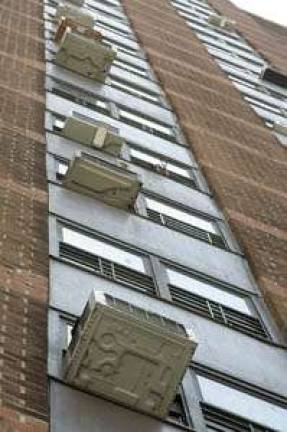Fighting Falling Air Conditioners

By Amanda Woods When India Bidaisee recently visited the Upper East Side's Holmes Towers, she didn't expect that she would have to look out for falling air conditioners. "No, stand on this side," Bidaisee's friend and Holmes resident, Maria Laurano, cautioned as she passed by the tower where an air conditioner had fallen out of a 20th-floor window and plummeted into the Eisman Day Nursery playground at the end of May, narrowly missing a group of children. More recently, another air conditioner fell from the building into a grassy area away from the pedestrian path on June 23. In the wake of these incidents, the New York City Housing Authority (NYCHA) is heavily enforcing its already established regulations for air conditioner installation. "NYCHA has increased its focus on proper air conditioning (AC) installation and has sent additional letters on this matter to residents...We have increased our regular AC unit audits," a NYCHA spokeswoman said in a statement. Among the enforced guidelines is the need for supportive metal brackets to hold air conditioners in residents' windows. Air conditioners in immediate danger of falling must be immediately removed and replaced with a window guard. Only air conditioner installation specialists can remove the units from apartments, the spokeswoman said, but NYCHA maintenance workers can do so in emergency cases. Other air conditioner deficiencies, according to a June 22 letter issued to residents, must be repaired within three days. Those who don't comply can face eviction, the letter outlines, but the NYCHA spokeswoman said that no one has ever been evicted for an improperly installed air conditioner. Council Member Dan Garodnick, who represents the Upper East Side, said he is helping residents of the Holmes Towers and the neighboring Isaacs Houses understand the NYCHA guidelines "in plain language." "Installation and removal of air conditioning units is an extremely dangerous process, and people need to be aware of that," Garodnick said. Some local residents think that the enforcement is necessary. "I think it's a good idea, because the air conditioner is in for a long time and it can loosen," said a resident who wished to be called L.M. "It gives an extra lift and security to the AC." But she thinks eviction as a consequence for noncompliance is "a little bit extreme." Laurano said that the required brackets cost $30 each and are hard to afford. "You live in public housing," Laurano said. "Not everyone has the money." "It's expensive to do that, but I think it's safe so [another incident] won't happen again," one resident said. Garodnick said he could not recall another incident when an air conditioner had fallen in his district. The closest recent incident, according to an article in the New York Post, was in 2006, when a woman was injured by an AC unit that fell out of a window on East 104th Street, north of Garodnick's district. Outside of the NYCHA system, the Department of Buildings is also stepping up its enforcement of proper air conditioner installation. Window air conditioners are now designated as "safe or "unsafe," according to a department document, instead of "safe with a repair and maintenance program," because of a rise in unstable ACs in the city. For those marked as unsafe, a department representative must sign off, confirming that repairs were completed. Sally Maldonado, the director of the Eisman Day Nursery, believes NYCHA residents may have the hardest time meeting AC installation guidelines. "You have more accidents happening in NYCHA developments because you have more people who can't go out there and buy the bracket to install air conditioners properly," Maldonado said. Over a month later, Maldonado is still frightened and won't allow children on the playground.